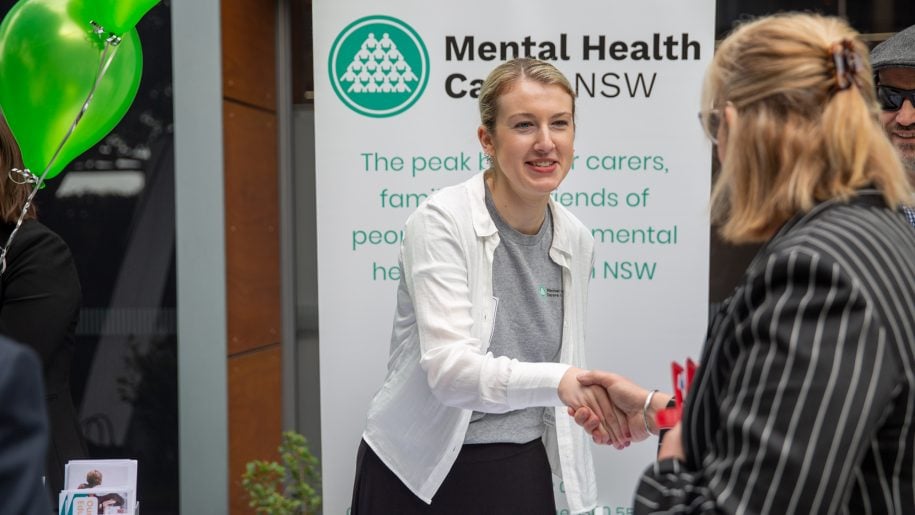
How do we advocate?
We are dedicated to working with and engaging mental health carers in our policy and advocacy work:
- Our Carer Connections Meeting meets monthly to engage with mental health carers regularly on issues for advocacy.
- Our Carers of Forensic and Corrections Patients Network meets monthly to advocate for change.
- We comment on policy and legislation through submissions and other advocacy.
- Provide policy advice through advisory committees with government agencies, and in collaboration with non-government organisations, and other stakeholders.
- Work closely with other advocacy groups.
- Consult with mental health carers on issues to feedback into policy and legislative reform through our Mental Health Carers Advocacy Network.
- Psychosocial disability advocacy through the Disability Advocacy Futures Project.
Carers of Forensic and Corrections Patients Network

Key Policy & Advocacy Areas
The best help a mental health carer can have is a safe, accessible and effective system of support for their loved one, which is why MHCN also engages in advocacy on mental health reform.
The following are a select few of the key areas that we have identified through our consultations with mental health carers and advocated for in our submissions.
Existing Submissions and Advocacy to Government Bodies
Submissions and Advocacy
- Carer Connection Helpline Report, 29 November 2025
- Summary of the NSW Government Response to the Statutory Review of the Mental Health Commission NSW 2025
- Submission to Mental Health Commission: Strategy for Mental Health and Wellbeing in NSW, 29 Aug 2025
- MHCN & BEING Joint Letter to Minister for Police, 31 July 2025
- NSW Healthcare Funding Inquiry, April 2025
- 2025 – 2026 Pre-Budget Submission, 16 December 2024
- Inquiry into the Prevalence, Causes and Impacts of Loneliness in New South Wales, 29 October 2024
- Review of the NSW Mental Health Commission, 21 June 2024
- Submission to Joint Standing Committee on the NDIS, 23 February 2024
- Submission to the NSW Special Commission of Enquiry into Healthcare Funding, 15 November 2023
- Review of the Anti-Discrimination Act 1977, 29 September 2023
- Response to the Inquiry into Equity, Accessibility and Appropriate Delivery of Outpatient and Community Mental Health Care in NSW, 13 September 2023
- Response to the Open Justice Review, 3 August 2021
Many mental health carers feel overwhelmed and stressed because the mental health system is hard to understand and use
- In NSW, mental health services are not well connected, making it hard for people with mental health issues and their carers and families to get the right help when they need it.
- MHCN wants changes to make the system easier to understand, so mental health carers don’t have to fill in the gaps. We’ve advocated for more funding for the Family and Carer Mental Health Program, especially to support peer workers from diverse communities who can help with advocacy and finding services.
- MHCN also supports funding for education programs to help carers understand the mental health system and learn about their rights and responsibilities under the NSW Mental Health Act 2007.
Provide more funding for early support, recovery services, and people who don’t get enough help (“the missing middle”)
- Most funding for mental health still goes to crisis care, not early help. Early support services don’t get enough funding and often don’t reach the people who need them most, like those in rural areas, low-income communities, and Aboriginal and Torres Strait Islander groups.
- Free and easy-to-access early support services, like headspace, help stop mental health problems from getting worse. These services work well for people at risk but currently get only a small share of funding.
- One reason there aren’t enough early services is because the NDIS relies on a market system. This creates gaps, especially where there aren’t enough providers. These gaps are biggest in areas like the justice system, and for people with intellectual disabilities or cognitive issues, where it’s hard to get the right support.
Fund Carer Peer Workers
- Carer Peer Workers offer specialised support and advocacy to mental health carers, based on their own lived experience of caring.
- Right now, in NSW, there aren’t enough Carer Peer Workers, and access to them depends on where you live or which service you use.
- MHCN recommends expanding the community-based organisations under the Family and Carer Mental Health Program to employ additional Carer Peer Workers, so that all areas of NSW have equal access to this support.
Provide tailored mental health and emotional support for mental health carers
- Mental health carers may experience distress, which puts them at higher risk of emotional and mental health problems.
- Carers of people in the justice system (forensic and corrections patients) are especially at risk of trauma and poor mental health because they don’t get the right kind of support.
- Right now, mental health carer needs are often left out when planning mental health support services.
- MHCN advocates for mental health carers to have access to emotional and mental health support that meets their specific needs, as part of a complete mental health system.
- Services need better understanding of the challenges and stigma faced by carers of people in the justice system.
Provide respite for mental health carers
- In its report to the Government, the 2024 Inquiry into Equity, accessibility and appropriate delivery of outpatient and community mental health care in New South Wales by Portfolio Committee No. 2 – Health, NSW Legislative Council found that ‘The fragmentation of mental health services in NSW leads to extraordinary difficulties for mentally ill people and their carers to navigate and access appropriate services and care. This difficulty often exacerbates mental distress, and contributes to inefficient use of limited resources.’ Finding 2
- The Committee made the following recommendation ‘That NSW Government ensure funding for carer education, supports and resources, including respite services.’ (Recommendation 3).
- MHCN believes that funding support for mental health carers – including respite services – will help reduce loneliness and isolation.
- MHCN currently runs a respite program that supports mental health carers and their families in NSW with an opportunity to take a break from their caring role, however more and other types of respite is needed including:
- In-home respite services additional to current existing programs, which are limited.
- Residential respite in each Local Health District across NSW.
- Flexible options such as carer respite cards to subsidise access to wellbeing, sporting and entertainment venues, which mental health carers can use on their own.

